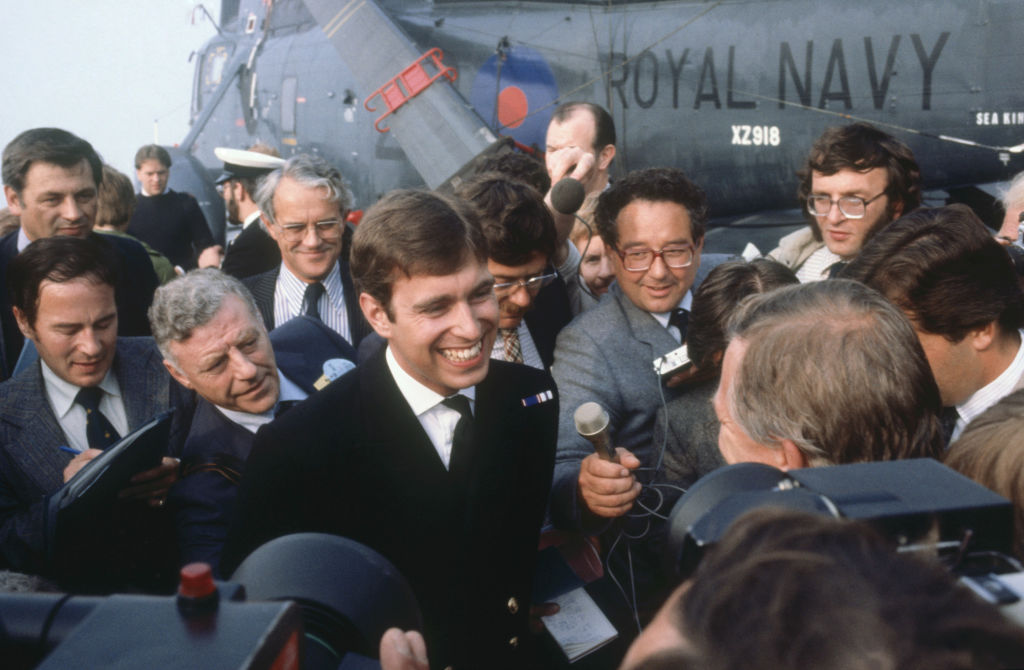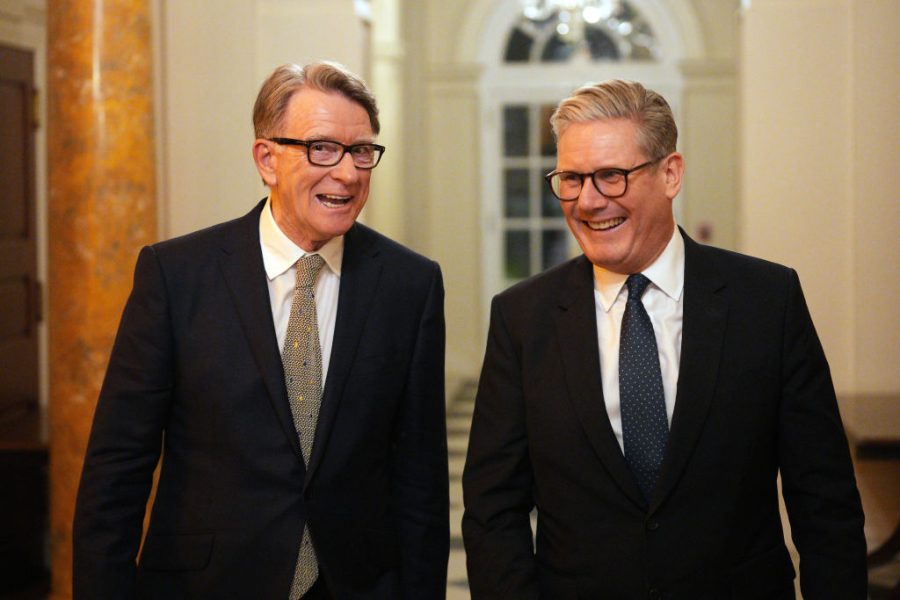The official response to growing public concern about Prince Andrew has been slow and hesitant. The King’s brother announced last month that he would ‘no longer use my title or the honours which have been conferred upon me’, having already agreed not to use the style ‘His Royal Highness’ in a public capacity in 2022. But there was a lingering sense that relying on the honour and discretion of a man who seems to possess neither was not quite enough.
Andrew’s brave service in the South Atlantic is a matter of record, for which he earned his South Atlantic Medal. It does not make him a good person, nor give him immunity for any later conduct
Last week, a statement from Buckingham Palace said that the King had ‘initiated a formal process to remove the Style, Titles and Honours of Prince Andrew’, and that he would be reduced to plain Andrew Mountbatten Windsor. But public opinion had scented blood, and righteous outrage is building.
The Defence Secretary, John Healey, has revealed that the process of removing Andrew’s last remaining military distinction, his rank as Vice-Admiral, was underway. He refused to comment, however, on the further suggestion that Andrew could lose his South Atlantic Medal, awarded for service in the Falklands conflict in 1982.
This is where we need to stop for a moment rather than cheering Nemesis on to bayonet the wounded. Taking away Andrew’s Falkland medal is categorically different from every other sanction imposed on him and crosses a line; to do so would be in effect to rewrite history.
The prickly group of sceptics, contrarians and the last few remaining supporters of the Duke of York have repeatedly argued that he has not been convicted of wrongdoing. His association with the convicted sex offender Jeffrey Epstein may have been unwise or unsavoury, they say, but it broke no law, and the 2022 settlement of the late Virginia Giuffre’s civil suit against Andrew – an undisclosed sum, but believed to have been around £12 million – specifically excluded any admission of liability. Some feel there is now a lynch mob in pursuit and that allegations are being elided with proven facts.
There is an element of truth to this. I have said several times that I think Andrew should lose his peerage titles and princely style, not because the allegations against him are accurate beyond peradventure – we will all have our own views of their plausibility – but because Andrew appears to have misled the public over his relationship with Epstein.Recently released emails appear to show that he as in touch with Epstein in 2011, despite saying in his BBC Newsnight interview that he cut off contact in 2010.
Andrew’s loss of title is about reputation, not proven criminal guilt: just as he was granted his honours as part of a superstructure of public pomp and ceremony, so he has violated the tacit compact under which members of the Royal Family live. He has enjoyed a life of privilege and wealth, in return for which he has been expected to act honourably, with dignity and dedication, in public service. When he failed to fulfil that bargain, he exposed himself to the forfeiture of his honours.
The South Atlantic Medal is of a different order. Andrew was commissioned in the Royal Navy as a sub-lieutenant in 1981, having graduated from Britannia Royal Naval College Dartmouth as well as completing the Royal Marines All Arms Commando Course. He then qualified as a helicopter pilot and was posted to 820 Naval Air Squadron aboard HMS Invincible. Nine weeks later, Argentina invaded the Falkland Islands, and Invincible was despatched to the South Atlantic as a lynchpin of the task force to take back the islands.
Andrew served throughout the conflict as a Sea King helicopter co-pilot, undertaking anti-submarine and anti-surface warfare, Exocet missile decoy operations and casualty evacuation, transport, and search and air rescue. This was genuinely dangerous work, flying above the aircraft carrier as a lure for Argentinian anti-ship missiles. The cabinet had wanted to move the 22-year-old prince to a desk job when the conflict broke out; the late Queen insisted he should be allowed to serve with his unit.
The South Atlantic Medal was awarded for service in the theatre of operations between April and June 1982, with an additional rosette – which Andrew has – for undertaking operational sorties. Around 33,000 medals have been issued, but only a tenth of those include the rosette. Andrew qualified easily.
If his medal is now taken away, what exactly are we trying to say? That he did not serve, and serve gallantly, in the Falklands conflict? That is sheer negation of reality. The only logical message it sends is that we have collectively decided that his recent conduct and behaviour is so heinous that it outweighs and cancels out his military service. And that will not do.
Andrew’s brave service in the South Atlantic is a matter of record, for which he earned his South Atlantic Medal. It does not make him a good person, nor give him immunity for any later conduct. But to pretend it did not happen, to impose a kind of damnatio memoriae on him, says nothing about his military service and everything about our wish to prove our own virtue. A bad man must always have been a bad man, in every way, and we cannot tolerate any suggestion otherwise. We have to stop here, and grow up: take honours away from a dishonourable man, but do not pretend he did not serve with distinction.








Comments